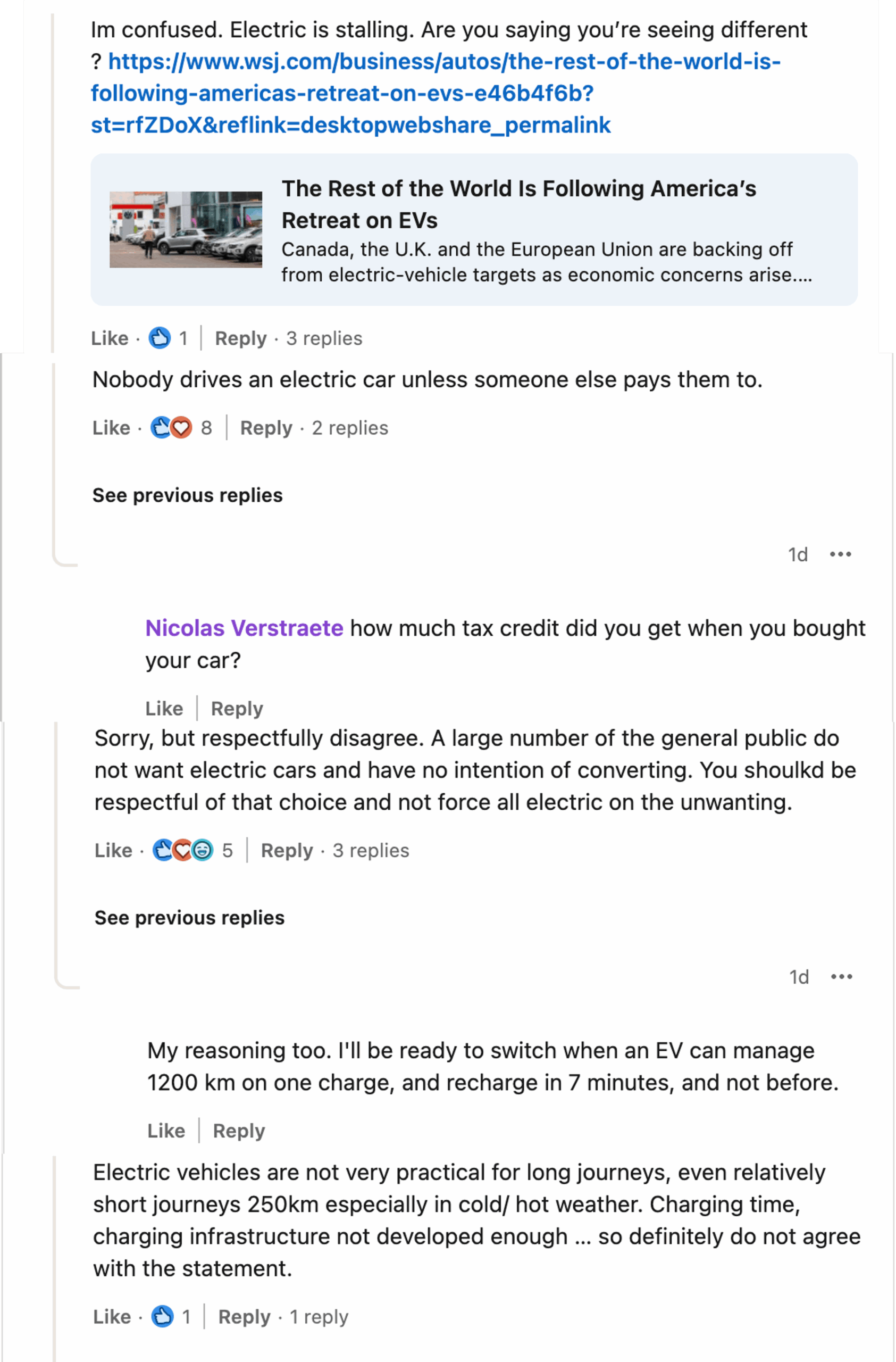A few weeks ago, I shared a story from the field.
One of our clients in Belgium had implemented a corporate mobility budget and transitioned to a fully electric vehicle fleet.
Less than a year later, they faced an unexpected issue: unused combustion cars sitting in the parking lot.
The goal of my post wasn’t to promote EVs — it was to discuss sustainable fleet management and the very real challenges companies face when electrification, employee turnover, and fiscal policies intersect.
And yet, the reactions told a much bigger story.
💬 A Flood of Emotions Around Sustainable Mobility
The post reached far more people than expected and sparked hundreds of comments — many thoughtful, but also surprisingly emotional.
From “EVs aren’t practical for long trips” to “nobody drives one unless someone pays them to”, it revealed something deeper about how people react to change in corporate mobility.
Interestingly, most of the people commenting weren’t even from Belgium — or sometimes even from Europe.
Many came from the U.S. and U.K., where the context is entirely different:
- company cars are rare,
- fiscal incentives for EVs are lower, and
- public transport and cycling infrastructure are far less developed.
No wonder the discussion felt like two different realities.
What seems obvious in Belgium — a company switching to electric or introducing a mobility budget — can look radical elsewhere.
⚙️ The Psychology Behind Mobility Change
When a company redefines its internal mobility policy, employees often feel uncertainty.
Switching from a company car to a mobility budget or bike-for-work scheme isn’t just a logistical change — it’s a cultural one.
That’s why at Next Mobility, we don’t only deliver mobility consulting for companies; we focus on mobility coaching and change management.
Helping employees understand the advantages of the mobility budget and the benefits of active mobility (walking, e-biking, car sharing) is key to long-term success.
🇧🇪 The Belgian Example: A Fast-Moving Market
Belgium offers a unique environment for sustainable corporate mobility.
Because of its fiscal incentives and ATN (benefit-in-kind) taxation, companies have accelerated the electrification of their vehicle fleets faster than in many EU markets.
- In 2024, battery-electric vehicles represented almost 30 % of new registrations.
- More than two-thirds of those were company cars.
- The country now counts over 83,000 workplace and public charging points, reflecting the rapid development of EV charging infrastructure for companies.
From my own experience, the number of cases where an electric company car doesn’t fit is actually very limited.
For others, the corporate mobility budget opens the door to public transport, shared cars, and even Mobility-as-a-Service (MaaS) solutions — especially in cities like Brussels.
🌍 Electrification Is Not the Debate — It’s the Direction
For me, fleet electrification is not up for debate anymore.
It’s one of the necessary steps to reduce corporate carbon footprints and ensure sustainable mobility for employees and future generations.
The real question is how companies manage the transition:
- How do you design a corporate travel plan that works for everyone?
- How do you combine EVs, e-bikes, public transport, and shared vehicle fleets?
- How do you encourage soft mobility awareness and long-term adoption?
That’s where data, experience, and empathy matter more than ideology.
🤝 Supporting Companies Through the Shift
At Next Mobility, we help organizations design and implement sustainable mobility strategies:
- Building a corporate mobility plan aligned with HR and CSR objectives
- Electrifying fleets and managing charging infrastructure
- Coaching employees in sustainable commuting habits
- Deploying mobility solutions for companies in Brussels and across Belgium
Because when employees experience the freedom of new mobility — whether through an electric car, an e-bike, or public transport — they rarely want to go back.
💡 Final Thought
The discussion around EVs often hides a deeper truth: we’re not just talking about cars.
We’re talking about how we move, how we work, and how we adapt to change.
And while the global debate can sound polarized, the Belgian experience proves something simple:
with the right framework and mindset, sustainable mobility becomes the obvious choice.
🧭 Why do you think sustainable mobility still triggers such strong reactions?
Is it fear of change, habit, or a lack of local understanding?
#CorporateMobility #SustainableFleetManagement #EVTransition #MobilityBudget #ChangeManagement #NextMobility #MobilitySolutions #Belgium #Sustainability
